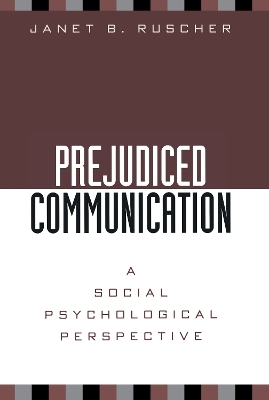
Prejudiced Communication
Guilford Publications (Verlag)
978-1-57230-638-7 (ISBN)
- Titel ist leider vergriffen;
keine Neuauflage - Artikel merken
Prejudiced communication is everywhere. Sexist jokes are transmitted over the Internet, coworkers tell outrageous stories about cross-cultural interactions, and children observe their parents' disgusted facial expressions as a target of prejudice passes along the street. What functions do these forms of communication serve for individuals, groups, and entire cultures? How do they contribute to the perpetuation of discrimination and status differences based on race, ethnicity, gender, sexual orientation, or other stigmatized attributes? And what can be done to reduce prejudiced communication and mitigate its harmful effects? This volume provides a comprehensive examination of these and other questions of critical importance for today's society. Bringing together current theory, empirical research, and real-life examples, it is essential reading for scholars and students in a range of disciplines.
The book first defines key terms and introduces several functions served by prejudiced communication, including the protection of established social hierarchies and the maintenance of cognitive shortcuts. It explores how language reflects categorizations of ingroups and outgroups, and how shared stereotypes are encoded and transmitted. Subsequent chapters address ways that prejudice is subtly or blatantly communicated in interpersonal interactions, including patronizing and controlling speech, discriminatory nonverbal behavior, and disdain for nonstandard accents or dialects. Next, the book examines the larger cultural context, discussing such topics as skewed portrayals in the news media, entertainment, and advertising; hostile humor; and continued legal tolerance of hate speech. Featured throughout are thought-provoking examples drawn from the classroom, the workplace, and other everyday situations. A concluding chapter summarizes major themes of the book and points toward empirical and theoretical gaps that invite further investigation.
Grounded in a social psychological perspective, the book also incorporates ideas and findings from communication, sociology, and related fields. It is an informative resource for anyone interested in prejudice and stereotyping, and an indispensable text for advanced undergraduate and graduate-level courses.
Janet B. Ruscher, PhD, is an Associate Professor in the Department of Psychology at Tulane University. She earned both an MS degree and a PhD in social psychology at the University of Massachusetts-Amherst, where she also received the student publication award from Division 8 of the American Psychological Association. Her work at the University of Massachusetts, with Susan Fiske, initially focused on the relation between stereotyping and competitive interdependence, while later work focused on stigma and decisions about discontinuing interdependence. Her current research interests lie primarily with stereotyping and prejudice in everyday communication. Dr. Ruscher's recent empirical work has been published in the Journal of Personality and Social Psychology, Personality and Social Psychology Bulletin, and the Journal of Language and Social Psychology. An integrative review of her research on prejudiced communication appeared in the 1998 volume of Advances in Experimental Social Psychology.
1. Introduction: The What and Why of Prejudiced Communication
2. Language That Divides
3. Developing and Using Shared Stereotypes
4. Talking Down to Outgroup Members
5. Preferred Cultural Patterns and Nonverbal Behavior
6. The News Media
7. The Culture of Prejudice
8. Afterword: What Is Known and What Is Unknown
References
Index
| Erscheint lt. Verlag | 21.6.2001 |
|---|---|
| Verlagsort | New York |
| Sprache | englisch |
| Maße | 152 x 229 mm |
| Gewicht | 558 g |
| Themenwelt | Geisteswissenschaften ► Psychologie ► Sozialpsychologie |
| Sozialwissenschaften ► Kommunikation / Medien ► Kommunikationswissenschaft | |
| ISBN-10 | 1-57230-638-6 / 1572306386 |
| ISBN-13 | 978-1-57230-638-7 / 9781572306387 |
| Zustand | Neuware |
| Haben Sie eine Frage zum Produkt? |
aus dem Bereich


